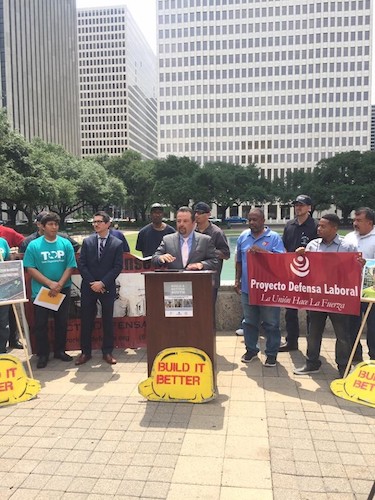The construction industry is booming across the South, but it’s resulting in too many low-wage, dead-end jobs, according to a new report from the Workers Defense Project.

|
|
Houston Local 716 member Paul Puente speaks at a press conference on May 9 announcing the release of a report on the egregious working conditions for construction workers in the South.
|
The Austin-based workers’ rights organization interviewed over 1,400 construction workers in six major cities in the South and found that race-to-the-bottom bidding is taking its toll on the men and women doing the work.
Titled “Build a Better South,” the report found that more than half of construction workers made less than $15 an hour and that workplace injuries and safety breeches are all too common. In 2015, 900 people were killed on the job and 1 in 7 have been injured during their career. Less than half of construction workers got medical insurance through their employers.
“We need to be encouraging people to enter the skilled trades, not pushing them out with unsafe working conditions and next-to-no compensation,” said Houston Local 716 member Paul Puente who is also executive secretary of the Houston Gulf Coast Building and Construction Trades Council.
Released May 9, the report surveyed workers in Atlanta; Charlotte, N.C.; Dallas; Houston; Miami and Nashville, Tenn. In addition to looking at safety and health care, the investigation estimated that construction workers are cheated out of almost $30 million a year in wages by employers who falsely classify their employees as independent contractors. This lets employers skirt having to offer benefits or workers’ compensation.
“The goal is to make safety the No. 1 priority,” said Puente, who spoke at a press conference at Houston City Hall on the study. “In order to do that, we need to change the culture.”
Nashville had the highest rate of injuries, at 10 percent, reported Nashville Public Radio. And that number could be higher – up to four times higher, say the study authors – as employers discourage their employees from reporting at all.
Recommendations include better enforcement of existing laws, ensuring workers make at least $15 an hour, receive at least 10 hours of OSHA safety training and have some type of insurance, either medical or workers’ compensation.
Puente said he and other workers’ rights activists are using the study as a way to educate and organize, visiting job sites to let people know about their rights and options. They are also sharing the information with community organizations and elected officials. In some cases, Puente said, the workers are coming to them.
“They’re fed up and they’re looking for a way out,” he said. “Some are looking for more training and want information on our apprenticeships.”
The Building Trades Council is pushing for a responsible bidder ordinance that would address many of the report’s findings. It would require minimum safety standards be met on any projects involving taxpayer dollars and that employers provide insurance benefits. It would also require that contractors participate in a Department of Labor-approved apprenticeship program and comply with prevailing wage standards.
Puente says they introduced it to the mayor and are requesting meetings with the rest of the city council, as well as county officials. Similar to others in Illinois, Indiana and Iowa, the ordinance would not only drive off unscrupulous bidders, it would ensure that public projects go to contractors with the most qualified workforce, ultimately saving money.
“There’s a perception that IBEW is expensive, but that’s not the case,” Puente said. “We do it safer and we do it right the first time – and on time. It’s a much better investment of taxpayer money.”
The Building Trades Council also supports the Better Builder program, which is a commitment by developers to adhere to high safety standards and working conditions. The program, run by the Workers Defense Project, also provides inspections to ensure compliance with state and local laws.
The WDP produced the report with the Partnership for Working Families and the College of Urban Planning and Public Affairs at the University of Illinois at Chicago. Click here to read it.